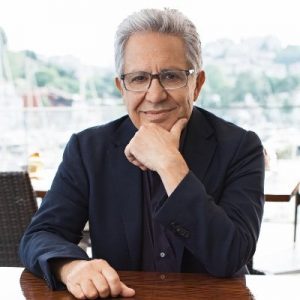Zülfü Livaneli, famous musician and novelist, several years ago wrote that Turkey was heading towards a great polarization between Islamists, Kurds, and Turkish nationalists.[1] Livaneli later revised his views and wrote that the polarization was taking place between Islamists, Kurds, and secularists.[2] Unfortunately, Livaneli’s prediction became a self-fulfilling prophecy and in recent years polarization between three major blocs in Turkey have increased considerably. In this piece, I am going to explain three different electoral blocs in Turkey.

Zülfü Livaneli
Although on the paper Turkey is a monolithic country with 99.8 % Muslim population, in fact there are different social groups and ethnic cleavages. First of all, around 19 % of the population have Kurdish origin and identity. In addition, among the Muslim population, a considerable portion consists of Alevis, a different and secularized Muslim sect.
The biggest bloc in Turkey is the Islamist-nationalist bloc that consists of various conservative, Islamists, and nationalist groups as well as center-right voters. This group appeals to nearly 55 % of the total population and historically acts as a unified force when there is a charismatic leader. The most important common denominator for this group is the Sunni-Islam identity. This group rules Turkey since 2002 with AK Parti (Justice and Development Party) coming to power and will continue to have high chances to win elections in the future due to its population density. But the problem for this group now is that the economy of Turkey is not going very well in recent months with the rising inflation and the devaluation of Turkish lira against U.S. dollar and euro. So, the ruling bloc of AK Parti and Turkish nationalist MHP (Nationalist Action Party) under the banner of People’s Alliance (Cumhur İttifakı) might have difficult days ahead especially if they lose the next presidential election in 2023. One other key problem for this group is that due to MHP’s Turkish nationalist rhetoric and policies, Kurds and even Islamist Kurds who supported the governing bloc against the secular establishment with the hope of establishing a more democratic moderate Islamist regime in the past now support the opposition.
The second bloc consists of various segments of secularists and it is differentiated from the governing bloc on the basis of people’s secular lifestyles. Of course, Kemalist-social democratic CHP (Republican People’s Party) is the leading party within this bloc. CHP appeals to social democrats, democratic socialists, secular liberals, Kemalists, and secular nationalists at the same time. Good Party (İYİ Parti) on the other hand is a new right-wing political party that strengthens this bloc by stealing votes from classical Turkish nationalist party, MHP. İYİ Parti is differentiated from MHP by its strong secular identity and opposition to AK Parti and Erdoğan regime. This group reaches 30-35 % of the population and in case they might choose a charismatic candidate who could appeal to Kurds and some groups within the Islamist bloc, they might rule Turkey for a while. Istanbul mayor Ekrem İmamoğlu for the moment seems to be the ideal candidate but due to CHP’s insistence on parliamentary system, Mr. İmamoğlu might not want to become a temporary President who would give up from his powers. In that case, CHP leader Kemal Kılıçdaroğlu might become the presidential candidate of the Nation Alliance (Millet İttifakı). On the other hand, this bloc’s biggest disadvantage is the existence of strong prejudices and opposition towards the authoritarian single-party era between 1923 and 1950 among the conservative and Islamist circles.
Finally, the third bloc consists of Kurds. Kurds were able to establish their own political parties since the mid-1990s and have become an independent political actor in recent decades. Although Turkish State repeatedly closed down pro-Kurdish political parties, Kurds each time were able to establish a new and stronger political party. This bloc appeals to approximately 15 % of total population having adopted Kurdish identity and culture. They made significant electoral gains with HDP (Peoples’ Democratic Party) under the leadership of young and charismatic Selahattin Demirtaş, who is now imprisoned. Many Kurds in the past supported the Erdoğan regime and voted for AK Parti since the government was implementing the peace process. However, I think Kurds will now support the opposition since the peace process was collapsed and the government is getting more nationalist.
The leader who will govern Turkey has to be embraced by different blocs and should have a mixed identity. Strong secularist rhetoric might not be enough for winning the election like Islamist and/or Turkish only rhetoric. Turkey needs a new political rhetoric appealing to all different blocs similar to early AK Parti era.
Assoc. Prof. Ozan ÖRMECİ
[1] https://www.gazetevatan.com/yazarlar/zulfu-livaneli/chp-ve-uc-kutuplu-turkiye-18454.
[2] https://t24.com.tr/yazarlar/zulfu-livaneli/uc-kutuplu-turkiye-gerceklesti,11527.
























































